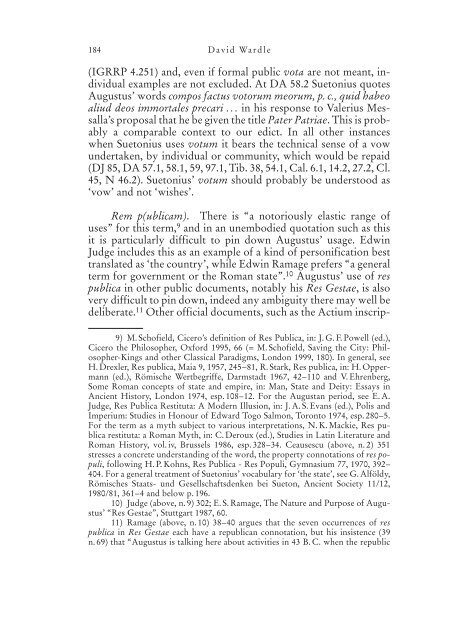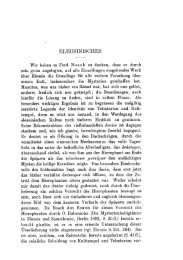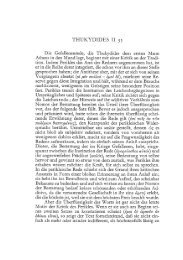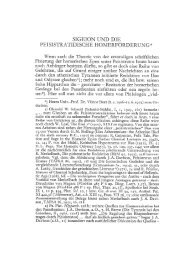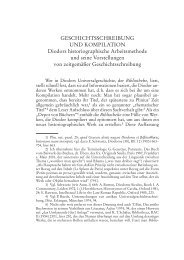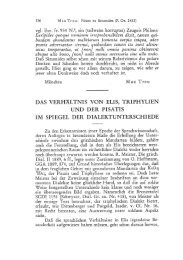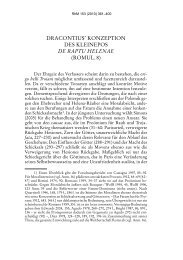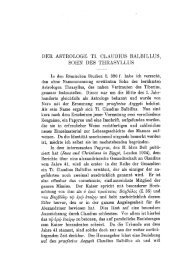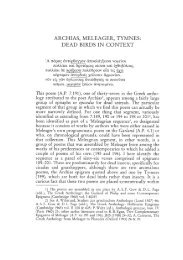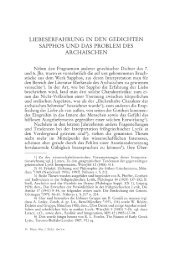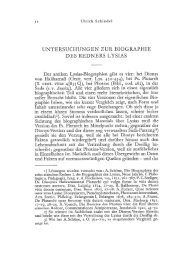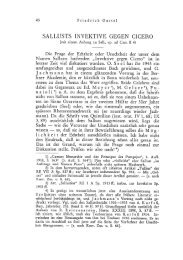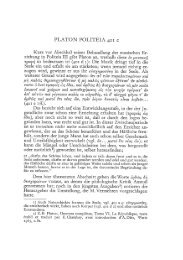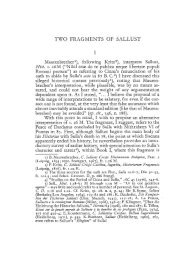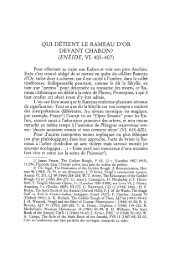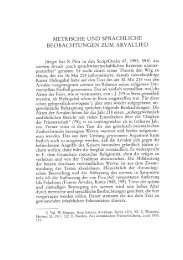VIRGILIO E STESICORO Una ricerca sulla Tabula Iliaca Capitolina *
VIRGILIO E STESICORO Una ricerca sulla Tabula Iliaca Capitolina *
VIRGILIO E STESICORO Una ricerca sulla Tabula Iliaca Capitolina *
Sie wollen auch ein ePaper? Erhöhen Sie die Reichweite Ihrer Titel.
YUMPU macht aus Druck-PDFs automatisch weboptimierte ePaper, die Google liebt.
184 David Wardle<br />
(IGRRP 4.251) and, even if formal public vota are not meant, individual<br />
examples are not excluded. At DA 58.2 Suetonius quotes<br />
Augustus’ words compos factus votorum meorum, p. c., quid habeo<br />
aliud deos immortales precari . . . in his response to Valerius Messalla’s<br />
proposal that he be given the title Pater Patriae. This is probably<br />
a comparable context to our edict. In all other instances<br />
when Suetonius uses votum it bears the technical sense of a vow<br />
undertaken, by individual or community, which would be repaid<br />
(DJ 85, DA 57.1, 58.1, 59, 97.1, Tib. 38, 54.1, Cal. 6.1, 14.2, 27.2, Cl.<br />
45, N 46.2). Suetonius’ votum should probably be understood as<br />
‘vow’ and not ‘wishes’.<br />
Rem p(ublicam). There is “a notoriously elastic range of<br />
uses” for this term, 9 and in an unembodied quotation such as this<br />
it is particularly difficult to pin down Augustus’ usage. Edwin<br />
Judge includes this as an example of a kind of personification best<br />
translated as ‘the country’, while Edwin Ramage prefers “a general<br />
term for government or the Roman state”. 10 Augustus’ use of res<br />
publica in other public documents, notably his Res Gestae, is also<br />
very difficult to pin down, indeed any ambiguity there may well be<br />
deliberate. 11 Other official documents, such as the Actium inscrip-<br />
9) M. Schofield, Cicero’s definition of Res Publica, in: J. G. F. Powell (ed.),<br />
Cicero the Philosopher, Oxford 1995, 66 (= M. Schofield, Saving the City: Philosopher-Kings<br />
and other Classical Paradigms, London 1999, 180). In general, see<br />
H. Drexler, Res publica, Maia 9, 1957, 245–81, R. Stark, Res publica, in: H. Oppermann<br />
(ed.), Römische Wertbegriffe, Darmstadt 1967, 42–110 and V. Ehrenberg,<br />
Some Roman concepts of state and empire, in: Man, State and Deity: Essays in<br />
Ancient History, London 1974, esp. 108–12. For the Augustan period, see E. A.<br />
Judge, Res Publica Restituta: A Modern Illusion, in: J. A. S. Evans (ed.), Polis and<br />
Imperium: Studies in Honour of Edward Togo Salmon, Toronto 1974, esp. 280–5.<br />
For the term as a myth subject to various interpretations, N. K. Mackie, Res publica<br />
restituta: a Roman Myth, in: C. Deroux (ed.), Studies in Latin Literature and<br />
Roman History, vol. iv, Brussels 1986, esp. 328–34. Ceausescu (above, n. 2) 351<br />
stresses a concrete understanding of the word, the property connotations of res populi,<br />
following H. P. Kohns, Res Publica - Res Populi, Gymnasium 77, 1970, 392–<br />
404. For a general treatment of Suetonius’ vocabulary for ‘the state’, see G. Alföldy,<br />
Römisches Staats- und Gesellschaftsdenken bei Sueton, Ancient Society 11/12,<br />
1980/81, 361–4 and below p. 196.<br />
10) Judge (above, n. 9) 302; E. S. Ramage, The Nature and Purpose of Augustus’<br />
“Res Gestae”, Stuttgart 1987, 60.<br />
11) Ramage (above, n. 10) 38–40 argues that the seven occurrences of res<br />
publica in Res Gestae each have a republican connotation, but his insistence (39<br />
n. 69) that “Augustus is talking here about activities in 43 B. C. when the republic


